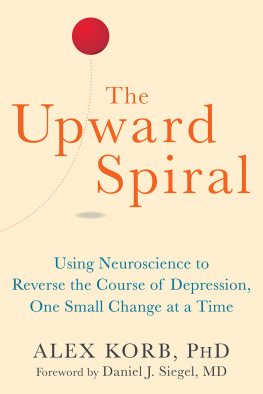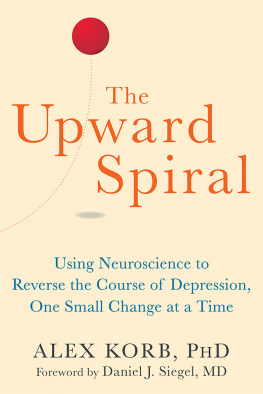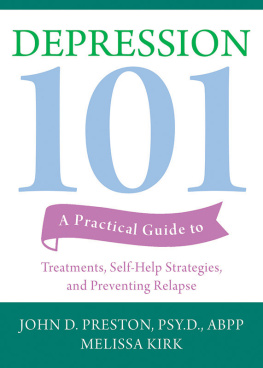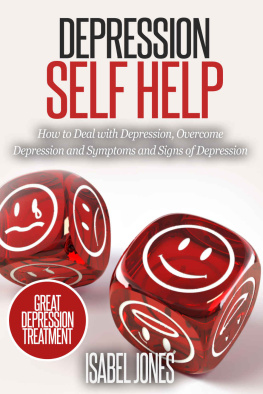
Alex Korb, PhD, is a neuroscientist who has studied the brain for over fifteen years, starting with an undergraduate degree in neuroscience from Brown University. He received his PhD in neuroscience from the University of California, Los Angeles, where he wrote his dissertation and numerous scientific articles on depression. He is currently a postdoctoral neuroscience researcher at UCLA in the department of psychiatry. Outside of the lab, he is a scientific consultant for the biotech and pharmaceutical industry, and is head coach of the UCLA Womens Ultimate Frisbee team. He has a wealth of experience in yoga and mindfulness, physical fitness, and even stand-up comedy.
Foreword writer Daniel J. Siegel, MD, is executive director of the Mindsight Institute and associate clinical professor of psychiatry at the University of California, Los Angeles School of Medicine. He is author of The Developing Mind, The Mindful Brain, and other books, and founding editor of the Norton Series on Interpersonal Neurobiology.
Alex Korbs The Upward Spiral is a masterful account of the neuroscience behind depression, as well as of concrete steps that will lead to an upward spiral out of depression. Korb explains neuroscience in a clear and accessible way, and shows how various brain malfunctions lead to different symptoms of depression. Throughout the [book], Korb circles back to some of his own experiences, making his account all the more powerful and real. This book is a must-read for those who struggle with depression and want some guidance on how to understand and manage itas well as for therapists who want to learn more about the neuroscience of depression and its treatment.
Elyn Saks, Orrin B. Evans Professor of law, psychology, psychiatry, and the behavioral sciences at the University of Southern California Gould School of Law, and author of The Center Cannot Hold
Alex Korbs The Upward Spiral is a clear and engaging explanation of the neuroscience behind depression. Korb sheds light on this mysterious and often misunderstood disorder, and, in the process, enlightens the reader about the basics of the brain and how it shapesand is shaped byour moods, motivations, decisions, and actions.
Anson Dorrance, head coach of the UNC-Chapel Hill Womens Soccer team and coauthor of The Vision of a Champion
The Upward Spiral presents an engaging, accessible, and informative synthesis of the current thinking on depression and its treatment. A cohesive neuroscience perspective is skillfully interwoven with a practical guide to strategies that can both attenuate pathological negative moods, as well as enhance emotional well-being across the clinical spectrum.
Helen S. Mayberg, professor of psychiatry in neurology and radiology, and Dorothy C. Fuqua Chair in psychiatric neuroimaging and therapeutics at Emory University School of Medicine

Publishers Note
This publication is designed to provide accurate and authoritative information in regard to the subject matter covered. It is sold with the understanding that the publisher is not engaged in rendering psychological, financial, legal, or other professional services. If expert assistance or counseling is needed, the services of a competent professional should be sought.
Distributed in Canada by Raincoast Books
Copyright 2015 by Alex Korb
New Harbinger Publications, Inc.
5674 Shattuck Avenue
Oakland, CA 94609
www.newharbinger.com
Parts of this book first appeared, in different form, on the authors Psychology Today blog.
Cover design by Amy Shoup
Text design by Michele Waters-Kermes
Acquired by Angela Autry Gorden
Edited by Jennifer Eastman
All Rights Reserved
Library of Congress Cataloging-in-Publication Data on file
For Mandy and all the girls she left behind
Contents
Foreword
In this marvelous tour of the brain, our able guide Alex Korb offers us practical knowledge and useful tools that can help us improve our lives from the very first pagesfrom different ways of thinking to specific actions we can take. But how can knowledge and tools actually help us?
We now know that what you do with your mindhow you focus your attention, intentionally shape your thoughts, and purposefully calm your emotionscan directly change your brain. Thats the key to neuroplasticityhow our experiences, including what we do with our minds, actually change the activity and even the lifelong remodeling of our brains. As a practicing psychiatrist, Ive learned that knowing about the details of how the brain works can uniquely empower people to improve their lives. This book offers powerful and practical ways you can use this neural knowledge to enhance your relationships, decrease worry and anxiety, and lessen the burden of depressive thinking and moods.
In this engaging immersion, youll enter the important world of applied neuroscience with someone whose doctoral work at one of the most prestigious neuroscience programs in the world, as well as his own personal journey, has brought him up close and personal with the ability of the human brain to right itself from its unfortunate tendency to spiral downward into worry, anxiety, and depression. Whether you or someone you know is prone to excessive ruminations, self-deprecating inner commentaries, or outright depressive moods, or you simply want to enhance your life by using incisive knowledge about your brain to make life more understandable and enjoyable, this book will be a gift along your journey.
The Upward Spiral has been a joy for me in its clarity, its cutting-edge science, and its inspiring translation of current research into practical tools for everyday life. Even though this is my field as a neuropsychiatrist, psychotherapist, and mental-health educator who focuses on the brain, I learned a ton and laughed a lot. This book is at the same time informative and fun.
I am happy and honored to offer these first words of welcome to you as you learn how the various regions of your brain can come to work well together to contribute to lessening your worry and enhancing your well-being. You can turn a tendency toward a downward spiral of depression and anxiety into an upward spiral of joy and clarity in your life. Amazingly, science now affirms that you can use your knowledge and understanding to change the way you harness the power of your mind to create wellness, joy, and connection in your life. And this book will show you how.
Daniel J. Siegel, MD
Introduction
In Madison, Wisconsin, a woman in her early thirties sits with her husband in a waiting room filling out paperwork. A scientist calmly attaches electrodes to her ankle, then leads her to an MRI machine. The MRI begins clicking and buzzing loudly, recording her brain activity as a small screen alerts her to impending electric shocks. While shes lying there dreading the coming sting, a predictable set of brain regions lights up, mostly in the circuits responsible for worrying and discomfort. Later, they scan her again, this time while her husband holds her hand. She still gets the same shocks and the same warnings, but her brain response has changed. The activity in both the worrying and discomfort circuits calms down.
In Japan, a young man pedals a stationary bike as scientists use infrared light sensors to monitor the blood flow in his brain. Just fifteen minutes of biking is sufficient to increase activity in circuits responsible for emotional control and to raise levels of the neurotransmitter serotonin.










